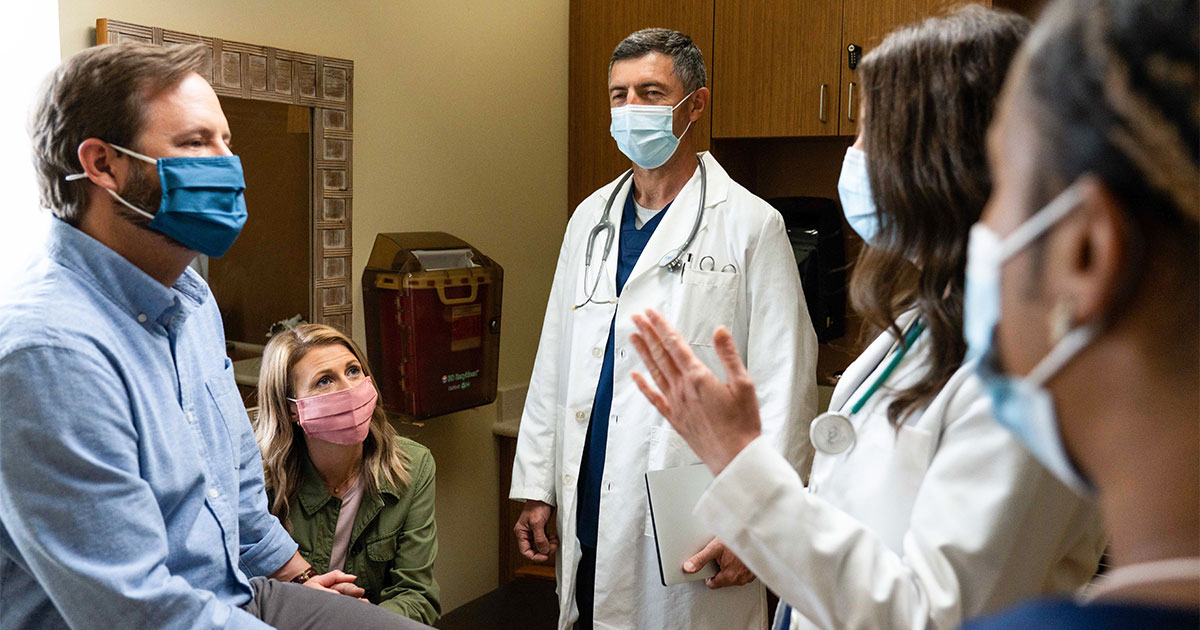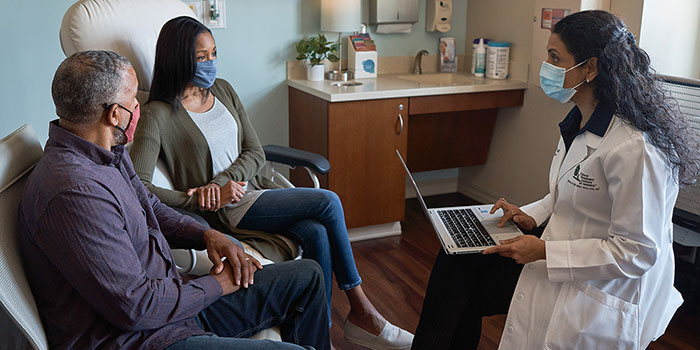
Most patients have questions and concerns if they’re thinking about participating in a cancer clinical trial. They want to know:
- Are cancer clinical trials safe?
- Will the trial drug cause more harm than good?
- Will the treatment be worse than the disease?
- Will participation be an additional burden on top of what I’m already going through?
Misconceptions surrounding clinical trials lead patients to wonder if their cancer will be treated at all if they agree to participate in a clinical trial.
“Am I going to be a guinea pig?” is one of the most common questions we hear from patients. Patients fear they’ll receive a placebo instead of treatment. (No, you won’t be a guinea pig. You’ll actively receive treatment while you’re in a cancer clinical trial. Participating in a clinical trial means you get the chance to be treated with a new treatment that may improve outcomes, but if you are in the control group, you will at least be given an approved, standard therapy.)
Clinical trials are one of the medical field’s safest environments for testing new drugs. Every therapy that’s part of the standard of care—every chemotherapy drug, targeted therapy drug and immunotherapy drug—had to go through the rigors of the clinical trial process before getting approved for use.
But we understand that patients have questions and concerns about the safety of clinical trials for cancer. We only treat cancer at Cancer Treatment Centers of America® (CTCA), and we actively participate in numerous clinical trials. We answer questions and counsel patients daily in our clinical trials program.
In this article, we’ll explain how clinical trials work, and we’ll answer some of the most common questions and concerns patients have. We’ll cover:
- What the different trial phases involve
- Patient safety during cancer clinical trials
- Risks and benefits of cancer clinical trials
- Financial considerations of clinical trials
- Eligibility for cancer clinical trials
- The role of genomic testing in cancer clinical trials
- How to find a cancer clinical trial
- Cancer clinical trials at CTCA®: What makes us different
If you’d like to learn more about the types of clinical trials we offer at CTCA, or if you’d like to talk with someone about your treatment options, call us or chat online with a member of our team.
Understanding clinical trial phases
The safety and efficacy of every new drug or therapy is established in phases during a clinical trial. This highly regulated process takes years to complete. Understanding the research study process may give you some peace of mind.
Phase 0 is the preclinical phase. All testing in this phase is performed in a lab on mice or some kind of animal model. If the drug shows promise of potential benefit and the researchers can provide evidence that it’s reasonably safe for human use in early clinical trials, the researchers submit an Investigational New Drug (IND) application to the U.S. Food & Drug Administration (FDA) to pursue additional testing. The FDA provides oversight during the entire process.
During phase I, researchers work to establish the safest, most appropriate dose of the drug. Usually no more than 50 patients participate during this phase. Patients are carefully monitored for side effects and changes as they start and continue the treatment during this phase.
Patients in this phase may have more frequent blood tests, EKGs or imaging scans than normal so that researchers can be sure the treatment isn’t causing harm and is showing some benefit.
Researchers usually start with the lowest possible dose of the drug in this phase and slowly increase the dosage in additional patients to determine the maximum tolerated dose. Dosage is weighed against the appearance of concerning side effects.
In Phase II of a clinical trial, researchers continue to monitor for safety, but the primary focus of this phase is the efficacy of the drug. We already know the dose and the safety profile. We’re just trying to establish how effective the drug is against the cancer.
Typically, about 100 patients participate in this phase of a trial. Depending on how the trial is set up, some patients may receive only standard-of-care treatment, while others receive the new drug. Some patients could get the new drug plus the standard of care therapy. Typically, patients know what treatment they’re getting in this phase of a study.
Phase III is typically a randomized, controlled trial. This is sometimes also called a placebo trial. In cancer trials, “placebo” doesn’t mean someone goes home with a sham medication. Everyone is treated with a therapy that's already been approved by the FDA for that type of cancer.
We already know the drug and the dose is safe. We know the expected side effects. During this phase, we’re trying to prove that the novel drug, or the new drug in combination with another treatment, is safer or has better outcomes than the current treatment.
During phase III, every patient typically receives the standard-of-care treatment, but some patients also receive the novel drug that’s already been tested in phases I and II. Neither the investigator nor the patient knows which they’re getting. Typically, over 300 patients participate in a phase III trial.
At CTCA, most of our trials are in phase II and III, but we do have a few phase I trials. The goal of our phase I trials is mostly to address an unmet need for patients who have no other treatment choices and need something new that we hope will improve their outcome.
Patient safety during cancer clinical trials
There’s no guarantee that the treatment you’re going to receive during a clinical trial is 100 percent safe or that your cancer will respond to it. However, there are also risks associated with standard-of-care therapy, and no therapy is guaranteed to work for everyone.
But, when you’re in a clinical trial, you’re being watched more closely than if you were receiving the standard-of-care treatment in a typical oncology setting, and there are potential benefits to that.
Some studies show that patients in a clinical trial may get better care than their counterparts outside of a trial. You not only have the oversight of your physician, but the research team is monitoring you very closely. They’re checking on every side effect you may experience, monitoring your lab results and following up on any issues you’re having, all of which may improve your quality of life during treatment.
On top of that, you have the clinical research organization, the sponsor of the trial, the FDA and other impartial, independent boards all monitoring you for safety. This oversight may include:
Institutional Review Boards (IRBs) review clinical trial protocols before they can accept patients. They closely watch the progress of the trial and can require changes or stop it at any time to protect the safety of the enrolled patients.
Data and Safety Monitoring Boards (DSMBs) are an independent group of experts who monitor the trial. They review trial data as it comes in to monitor the safety of the participants. They look for trends of toxicities they feel pose a risk to patients. They have the ability to require dosage changes or even stop the trial. They also review the data on the effectiveness of the trial.
The Office for Human Research Protections (OHRP) enforces regulations for patients’ protection.
The FDA also reviews trial data for accuracy throughout the process. They ensure researchers are following safety regulations to protect patients. The FDA is the agency that approves cancer drugs before they can be marketed and sold to the public.
Understanding the risks and benefits before you agree to join a trial

Every patient considering clinical trial participation receives an informed consent document. This comprehensive document has been reviewed by the IRB and details the purpose of the trial, along with potential risks and benefits.
The informed consent is often a very long document because researchers are required to list all the information about the trial, including a laundry list of possible side effects that you may never experience.
Some patients feel overwhelmed by the amount of information in the document. Your doctor and the research team will help explain the content and answer questions. You’ll have time to read the informed consent, research the information and talk to family and friends about it. Then, you can come back and ask questions.
While there are risks with any treatment, we wouldn’t offer this opportunity unless we believed that this new drug had the potential to improve your outcome vs. the current standard of care.
Participating in a cancer clinical trial can sometimes feel scary, but many patients are looking for new options for their cancer. Clinical trials allow patients to get access to drugs and new approaches that may not be available otherwise (or not for many more years), including the possibility of being treated with a drug that’s more tailored to your cancer type.
Make sure, however, you understand what your commitment is going to be if you agree to enroll. Consider when and how often you’re going to have to go in for an exam or testing. Is this something you’re going to be able to manage, especially if you’re juggling work and childcare at the same time? You may need to set up a support system to help.
You may be asked to keep a diary to record trial-related information. Someone from the research team may call to check in with you at regular times during treatment. If you experience any side effects, you may need to report them immediately.
If you agree to participate, you always have the option to drop out of a trial for any reason at any time.
The way to discover treatment advances is by going through this clinical trial process. By participating in cancer research, you might not only be helping yourself, but you may also be helping other patients in the future.
Financial considerations: How much is it going to cost?
Another common question patients have is, “Is this going to cost me more?” Many cancer patients experience financial toxicity from treatment, meaning the out-of-pocket costs of paying for cancer care leads to financial problems.
Most clinical trials have a sponsor that covers costs of care beyond the standard of care patients are responsible for. For example, your insurance will be billed for exams, labs or scans that are part of your standard treatment program, but anything extra that’s related to the trial is covered by the trial’s sponsor. This may include testing surrounding some novel therapies, such as genomic testing or additional scans.
Medicare began covering costs of clinical trial participation in 2000, and the Affordable Care Act mandated that insurance companies pay for clinical trials. The CLINICAL TREATMENT Act of 2020 requires Medicaid to pay for routine costs associated with clinical trial participation for those with a life-threatening condition, including cancer.
Who’s responsible for what costs is also outlined very clearly in the informed consent document. There shouldn’t be any surprises.
Who’s a candidate for cancer clinical trials?
Sometimes, patients worry that being asked to participate in a clinical trial means they have no other treatment options. This is sometimes true, but every clinical trial has very specific eligibility criteria, which may include the type and stage of your cancer, the (if any) treatments you’ve already received, other medical conditions you may have and your overall general health.
Clinical trials are available for every stage of treatment, and more trials are available these days for first-line therapies—the initial treatment delivered after a cancer diagnosis. For example, the FDA recently approved the immunotherapy drug pembrolizumab as a first-line treatment in certain patients with metastatic colon cancer after a clinical trial.
Many new clinical trials focus on more personalized therapies, such as immunotherapy and targeted drugs, or combination therapies, such as chemo-immunotherapy and targeted drugs plus immunotherapy. Genomic testing is key to many of these therapies.
The role of genomic testing in cancer clinical trials
Every cancer is unique. Every biomarker is unique. When we do a comprehensive genomic panel, we’re testing hundreds of genes at the same time, looking for biomarkers that may be driving the cancer.
If we identify a biomarker that can be matched to a specific treatment shown to be effective against that biomarker or abnormality, it may provide the patient with additional treatment options that are much more personalized than other conventional treatments. We’re treating the specific driver of the cancer rather than treating a cancer based on its location of origin.
In lung cancer, for example, we’ve identified eight biomarkers that respond to specific targeted drug therapies. Patients with these biomarkers may respond to the targeted drugs better than to chemotherapy, immunotherapy or even a combination of those therapies. Knowing whether your cancer has one of those biomarkers may provide you with a smarter treatment option.
At CTCA, we participate in trials known as basket trials, where treatment is driven by the genomic alteration of your cancer. So, it doesn't matter if you have colon cancer or breast cancer or a rare sarcoma. If genomic testing reveals that your cancer is driven by a specific mutation, and that mutation has been shown to respond to a specific targeted drug or immunotherapy, that may qualify you for a trial, such as the TAPUR clinical trial or the TAPISTRY trial, that would match you to a treatment specific to the pathway that's driving your cancer. It’s a much more personalized approach to cancer treatment.
This is why it’s important to be screened as soon as possible after a cancer diagnosis: to give you more opportunities to participate in trials earlier in treatment if you qualify. If we can tailor treatment to your cancer’s specific condition and biomarker makeup, we can potentially improve your outcome from the beginning.
How to find a cancer clinical trial

Less than 5 percent of cancer patients ever enroll in a clinical trial, and a large percentage of clinical trials never get off the ground because they can’t find enough patients to enroll.
The problem isn’t the lack of available trials or lack of patients with cancer, but that patients either aren’t aware of the trials or they’re not aware of them at the right time.
Clinical trials have very specific eligibility criteria, and sometimes the window for enrolling is narrow. For example, if you’ve had even one dose of a certain drug, and that drug is being used in a trial, you may no longer be eligible for that trial.
The majority of clinical trials are run in large academic hospitals or cancer treatment centers where cancer research is more common, but the majority of patients are treated in community oncology settings where they may not be aware of or screened for opportunities.
Sometimes, newly diagnosed patients hear about clinical trials from other patients through support groups. Or they read about promising therapies while researching their cancer online.
If your oncologist doesn’t participate in research, but you’re interested, you may have to advocate for yourself. This may sound intimidating if you’re already feeling overwhelmed by a cancer diagnosis and sudden changes in your life, but the benefits of reaching out early may be worthwhile in the long run.
- Start by asking your doctor whether clinical trials are offered where you’re getting treatment. If they are, ask whether you’re eligible for any now and whether there’s any specific testing you need to have done.
- If your doctor doesn’t participate in clinical trials, ask whether he or she works with any oncologists in the area who do, or whether there are any cancer research centers where clinical trials are offered in the area. Ask where you can get information about clinical trials.
- Search for trials on clinicaltrials.gov, the National Institutes of Health database. Some cancer-specific patient advocacy groups also have information about where to find clinical trials on their websites.
- If you haven’t had genomic testing done, ask your doctor if you should. Genomic testing, especially for patients with advanced cancer, is often covered by health insurance and Medicaid. It may require a simple blood test (a liquid biopsy) or a tissue sample.
You may also choose to be prescreened for potential clinical trials in the future. You may not be eligible now, but you may have the option of being placed on a waiting list if you’re eligible in the future.
Clinical trials at CTCA
CTCA is a community-oriented, patient-centered cancer treatment center where we also have the technology and resources to pursue clinical research. We do research because we’re committed to helping patients. Part of our mission is to search for and provide powerful and innovative therapies while treating patients with dignity and respect.
All our patients get screened for clinical trials, no matter where they are in their cancer journey. We also screen patients who live within about 250 miles from one of our cancer centers for all the known biomarkers for cancer, giving us one of the largest portfolios of biomarker-based clinical trials from a community oncology perspective.
We’re part of the National Cancer Institute’s National Clinical Trials Network, which means that any of our patients who qualify for one of the network’s clinical trials can participate while receiving care with us.
We’re a top contributor to the ASCO TAPUR study. We participate in the Just in Time Research program, which attempts to expand patient access to clinical trials while still receiving treatment in their local communities. We also have relationships with the major sponsors and clinical research organizations in the United States. We can work with almost any clinical trial that you qualify for.
The way CTCA is structured, with providers all under one roof, allows us to efficiently deliver the treatments delineated by the clinical trials, and it’s convenient for the patient and their caregivers. If you have to undergo several different kinds of treatment and/or tests, you’ll have them performed all in the same building at one of our hospitals. You don’t have to worry about getting across a large campus with multiple buildings. This allows us to offer multimodality types of trials in a patient-friendly way.
At CTCA, we feel it’s important for patients to be proactive about their options as soon as possible after a cancer diagnosis. You may not be interested in or eligible for a trial now, but if you’re prepared, you may have options lined up for the future.
If you’d like to learn more about the types of clinical trials we offer at CTCA, or if you’d like to talk with someone about your treatment options, call us or chat online with a member of our team.


